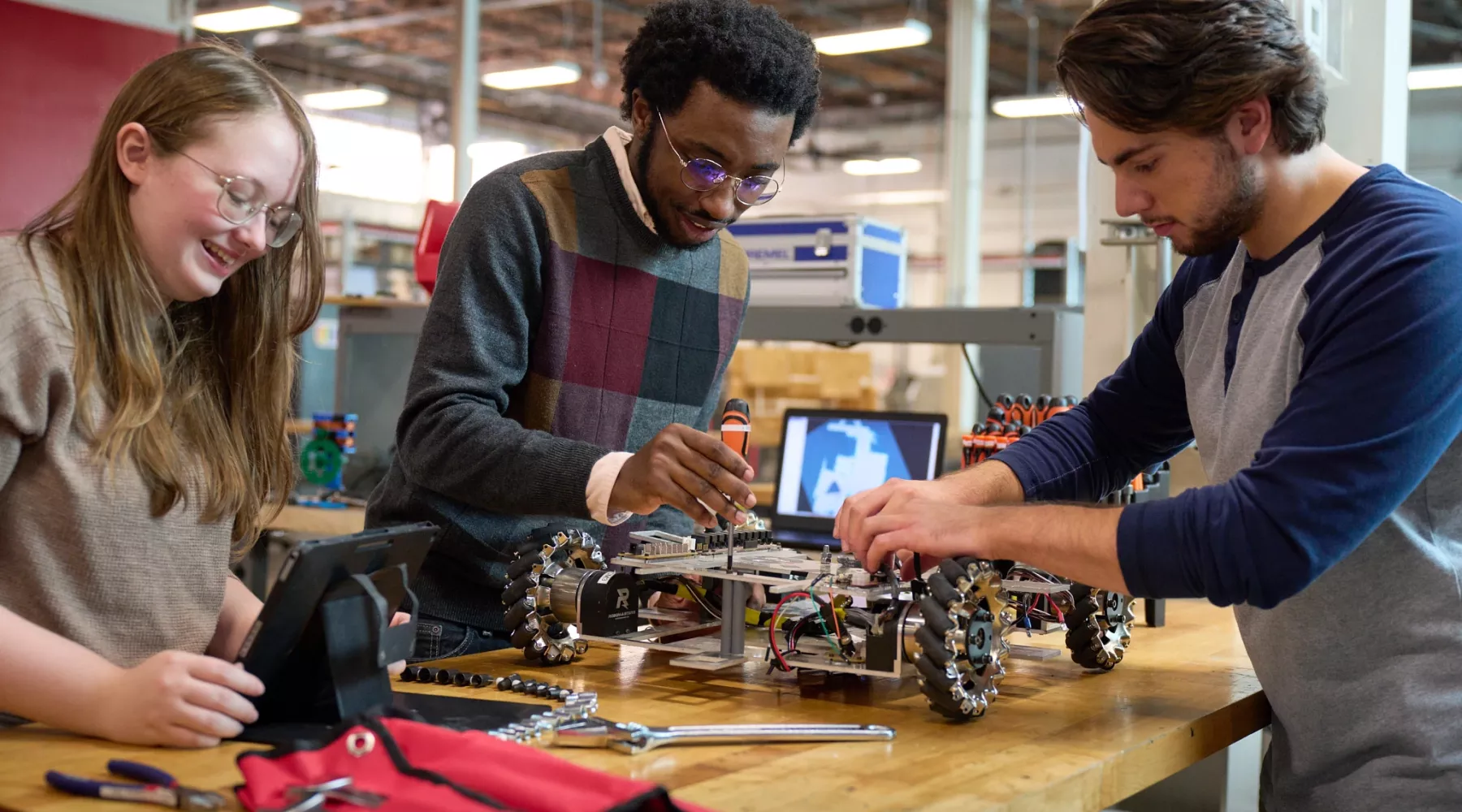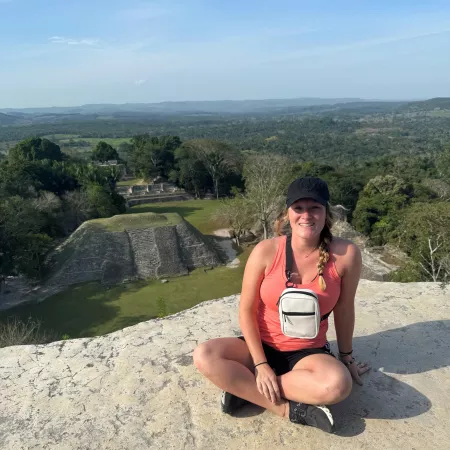
Developing Essential Skills
What are the 10 Essential Skills?
In 2021, the Kentucky Council on Postsecondary Education (CPE) identified 10 Essential Skills* they believe are critical for graduates to thrive post-graduation. The CEL is focused on students developing Essential Skills through participation in engaged learning.
| ESSENTIAL SKILL | DESCRIPTION |
|---|---|
| 1. Communicate Effectively | Communicate effectively by listening, weighing influencing factors, and responding accurately and professionally. Express thoughts coherently in writing, orally, and in formal presentations. |
| 2. Think critically to solve problems and create new ideas and solutions | Think critically by evaluating assumptions and assessing information to make informed conclusions. Think creatively by combining ideas in original ways or developing new ways of addressing issues. |
| 3. Apply quantitative reasoning skills to analyze and solve numerical problems | Hone ability to provide solutions guided by data and choose the best methodologies for arriving at informed conclusions. |
| 4. Interact effectively with others | Demonstrate both self-awareness and appreciation of people from other backgrounds, as well as the ability to collaborate, communicate, and work respectfully with others. |
| 5. Adapt to changing circumstances while leading and supporting others | Accept change and find effective ways to work and thrive in different settings. Motivate others in the pursuit of a common goal and coach others in the pursuit of this goal. |
| 6. Perform professionally | Adhere to the code of ethics in chosen profession and act with honesty and fairness. Prioritize tasks, manage time, take initiative, and demonstrate accountability and reliability. |
| 7. Engage in civic life to improve society | Engage in political, social, and other activities to address issues that benefit society. |
| 8. Collaborate and work in teams | Collaborate with colleagues, become effective team members, and manage conflict. |
| 9. Apply academic knowledge, skills, and abilities | Articulate and apply theoretical content of academic preparation with relevant knowledge and abilities essential to chosen career. |
| 10. Use information for decision making | Identify, evaluate, and responsibly use information needed for decision making. |
Develop Skills through Engaged Learning
By participating in a range of engaged learning experiences—including internships, study abroad, capstone projects, community engagement, and more—students build essential skills for academic, personal, and professional growth.
Essential Skills that may be developed through an internship or co-op experience include:
Communicate Effectively
- Interns regularly write emails, reports, and present ideas; they also participate in meetings and practice professional communication.
Think Critically & Solve Problems
- Interns are often tasked with solving real workplace problems, analyzing data, and thinking creatively to support team projects.
Apply Quantitative Reasoning Skills to Analyze and Solve Numerical Problems
- Depending on the field, interns may work with budgets, spreadsheets, metrics, or performance data to make decisions or inform recommendations.
Interact Effectively with Others
- Internship and co-op experiences expose students to various teams, clients, or communities, helping them learn how to collaborate across differences.
Adapt to Changing Circumstances While Leading and Supporting Others
- Interns must quickly learn new systems, respond to feedback, and support team goals—often in fast-paced, evolving environments.
Perform Professionally
- Internships are designed to model real workplace expectations. Interns must manage time, act ethically, follow protocols, and take initiative.
Collaborate and Work in Teams
- Interns frequently join team meetings or group projects, helping them develop collaboration, listening, and conflict resolution skills.
Apply Academic Knowledge, Skills, and Abilities
- Internships bridge theory and practice. Students apply what they've learned in class—like technical knowledge, research methods, or writing—on the job.
Use Information for Decision Making
- Interns are often expected to gather, evaluate, and apply information from reports, databases, or project briefs to inform their tasks.
Essential skills that may be developed through studying abroad or completing an ISLP include:
Communicate Effectively
- While abroad, students practice verbal and non-verbal communication often across language barriers, and develop confidence in expressing ideas clearly and professionally.
Think Critically to Solve Problems and Create New Ideas and Solutions
- Navigating a new country requires problem-solving, flexibility, and creative thinking—whether dealing with logistics, cultural norms, or academic challenges.
Interact Effectively with Others
- One of the core strengths of study abroad and ISLP is exposure to different cultures, ideologies, and perspectives which enhances empathy and understanding.
Adapt to Changing Circumstances While Leading and Supporting Others
- Students face unfamiliar environments, new routines, and different educational systems, helping them become more adaptable and resilient.
Civic Engagement to Improve Society
- Many programs include service components, global issue exploration, or cultural immersion, encouraging students to reflect on global citizenship and social responsibility.
Collaborate and Work in Teams
- Group projects, homestay dynamics, or working with international classmates develop teamwork and cross-cultural collaboration skills.
Apply Academic Knowledge, Skills, and Abilities
- Students often connect coursework to international contexts, gaining new insights and applying academic knowledge in real-world global settings.
Use Information for Decision Making
- Making travel, academic, and cultural decisions in unfamiliar contexts sharpens students’ ability to evaluate, select, and use information responsibly.
Essential skills that may be developed through completing a capstone project include:
Communicate Effectively
- Students deliver presentations, write formal reports, and engage in professional communication with peers, faculty, and often external stakeholders when completing a capstone project.
Think Critically to Solve Problems and Create New Ideas and Solutions
- Capstone projects require students to identify problems, analyze data or case studies, evaluate options, and often propose original solutions.
Apply Quantitative Reasoning Skills to Analyze and Solve Numerical Problems
- Many capstone projects involve data collection and analysis, budgeting, or use of quantitative tools depending on the discipline.
Interact Effectively with Others
- In team-based or community-facing capstone projects, students engage with various collaborators, clients, or populations, fostering strong communication.
Adapt to Changing Circumstances While Leading and Supporting Others
- Capstone projects often include unexpected challenges that require adaptability, leadership, and collaboration to adjust plans and stay on track.
Perform Professionally
- Capstone projects mirror professional environments with deadlines, accountability, project management, ethical considerations, and real-world standards.
Engage in Civic Life to Improve Society
- Many capstone projects focus on community issues, policy, or nonprofit initiatives, giving students a platform to make meaningful societal contributions.
Collaborate and Work in Teams
- Group capstone projects demand teamwork, project coordination, conflict resolution, and shared responsibility for outcomes.
Apply Academic Knowledge, Skills, and Abilities
- Capstone projects are designed to synthesize and apply the student’s major coursework in a practical context.
Use Information for Decision Making
- Students must gather, evaluate, and synthesize research, stakeholder input, and technical data to inform their decisions and recommendations with their capstone projects.
Essential skills that may be developed through participating in community engagement activities include:
Communicate Effectively
- Students must communicate clearly and respectfully with community members, often adapting messages for various audiences and settings.
Think Critically to Solve Problems and Create New Ideas and Solutions
- Community work requires understanding real-world challenges, identifying root causes, and collaborating on creative solutions.
Interact Effectively with Others
- Students work with individuals and groups who may differ in culture, identity, or lived experience.
Adapt to Changing Circumstances While Leading and Supporting Others
- Community settings can be unpredictable; students often adapt to new roles, shifting needs, and real-time feedback while supporting shared goals.
Perform Professionally
- In working with organizations, nonprofits, or community leaders, students learn to act with integrity, reliability, and professionalism.
Engage in Civic Life to Improve Society
- Students explore civic responsibility and social change by participating in service, advocacy, or community-based projects.
Collaborate and Work in Teams
- Whether working with classmates or community partners, students build teamwork, communication, and coordination skills.
Apply Academic Knowledge, Skills, and Abilities
- Students often bring course concepts (e.g., public health, education, business) into practical community contexts, applying theory to service or research.
Use Information for Decision Making
- Students gather community data, assess needs, and use information from multiple sources to shape their actions and recommendations.
Essential skills that may be developed through completing an undergraduate research experience include:
Communicate Effectively
- Students learn to clearly explain complex ideas in writing, presentations, and discussions—often preparing abstracts, posters, or scholarly papers.
Think Critically to Solve Problems and Create New Ideas and Solutions
- Research requires critical thinking to define problems, evaluate sources, interpret data, and form evidence-based conclusions.
Apply Quantitative Reasoning Skills to Analyze and Solve Numerical Problems
- Many research projects involve data analysis, statistical reasoning, or quantitative modeling to support findings.
Interact Effectively with Others
- Research often includes collaboration with faculty, peers, or community participants, broadening interpersonal and intercultural understanding.
Adapt to Changing Circumstances While Leading and Supporting Others
- Research doesn’t always go as planned—students learn to troubleshoot, pivot methodologies, and persist through setbacks.
Perform Professionally
- Undergraduate researchers are held to high standards of ethics, responsibility, time management, and academic integrity.
Collaborate and Work in Teams
- Many research projects are team-based or lab-based, fostering collaboration, peer learning, and shared accountability.
Apply Academic Knowledge, Skills, and Abilities
- Students apply disciplinary knowledge, methodologies, and theories in a real-world or scholarly setting.
Use Information for Decision Making
- Research demands locating, evaluating, and synthesizing credible information.

"My engaged learning experience allowed me the chance to know I can accomplish my goals, gain confidence, and have the ability to learn new skills."

